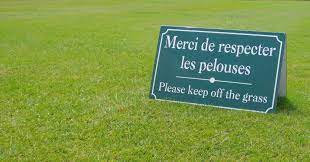Dealing with neighbors who drive on your lawn can be a frustrating and stressful experience. Not only does it damage your property, but it can also create tension between you and your neighbor. Fortunately, there are steps you can take to prevent this from happening.
Install Physical Barriers
One of the most effective ways to keep your neighbors from driving on your lawn is to install physical barriers. These can include fences, gates, bollards, or even large rocks or boulders. By physically blocking access to your lawn, you can ensure that your neighbor cannot drive over it.
If you choose to install a fence or gate, be sure to check local zoning laws and obtain any necessary permits. Additionally, you may want to consider a fence or gate that matches the style of your home and neighborhood. This can help to minimize any negative impact on your property values.
Post Signs
Posting signs is another way to discourage your neighbors from driving on your lawn. Signs can include messages such as “No Trespassing,” “Private Property,” or “Do Not Drive on Lawn.” By clearly indicating that your lawn is off-limits, you can make it less likely that your neighbor will attempt to drive on it.
However, be aware that signs alone may not be enough to deter determined individuals. Some people may ignore signs or not take them seriously, so it’s important to combine signs with other methods of protection.
Speak to Your Neighbor
If you’re comfortable doing so, consider speaking to your neighbor directly about the issue. Let them know that you’ve noticed them driving on your lawn and ask them to stop. Be polite and respectful, and try to understand their perspective. Perhaps they’re unaware that they’re causing damage, or maybe they’re in a hurry and don’t realize the impact of their actions.
In some cases, simply talking to your neighbor can resolve the issue. They may apologize and promise not to drive on your lawn again. However, be prepared for the possibility that your neighbor may not be receptive to your request.
Contact Local Authorities
If your neighbor continues to drive on your lawn despite your efforts to stop them, you may need to involve local authorities. Check with your local police department or sheriff’s office to see what options are available to you. In some cases, the police may be able to issue a warning or citation to your neighbor for trespassing.
Additionally, you may want to consider contacting your homeowners’ association (HOA), if you have one. Many HOAs have rules and regulations regarding property damage and trespassing, and they may be able to assist you in resolving the issue.
Install Surveillance Cameras
Installing surveillance cameras is another way to deter your neighbors from driving on your lawn. Cameras can provide evidence of any damage or trespassing, which can be useful if you need to take legal action. Additionally, the presence of cameras may be enough to discourage your neighbor from attempting to drive on your lawn.
When installing surveillance cameras, be sure to check local laws and regulations regarding privacy and surveillance. Additionally, you may want to consider placing signs indicating that your property is under surveillance. This can help to deter potential trespassers and can also protect you from legal issues if someone claims that their privacy was violated.
Landscape Your Lawn
Another way to discourage your neighbor from driving on your lawn is to landscape it in a way that makes it difficult to access. For example, you can plant bushes, shrubs, or trees along the perimeter of your lawn. This can create a natural barrier that makes it difficult for vehicles to drive over.
Additionally, you can install landscaping features such as raised flower beds or retaining walls. These can create physical barriers that prevent vehicles from accessing your lawn.
Consider Legal Action
If all else fails, you may need to consider taking legal action against your neighbor. Depending on the extent of the damage and the severity of the trespassing, you may be able to file a lawsuit for property damage or trespassing.
Consult with a lawyer who specializes in property law to determine your legal options. Your lawyer can advise you on the best course of action and can help you navigate the legal system.
Keep in mind that taking legal action should be a last resort. It can be time-consuming, costly, and can further strain your relationship with your neighbor. However, in some cases, it may be necessary to protect your property and ensure that your neighbor does not continue to drive on your lawn. neighbors who drive on your lawn
In conclusion, dealing with neighbors who drive on your lawn can be a frustrating experience. However, there are steps you can take to prevent this from happening. Installing physical barriers, posting signs, speaking to your neighbor, contacting local authorities, installing surveillance cameras, landscaping your lawn, and considering legal action are all effective ways to protect your property and discourage your neighbor from driving on your lawn. By taking action early, you can prevent damage to your lawn and maintain a positive relationship with your neighbor.

